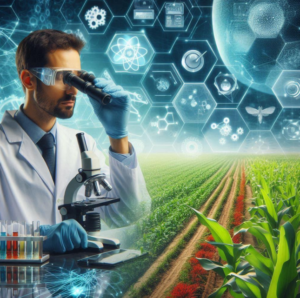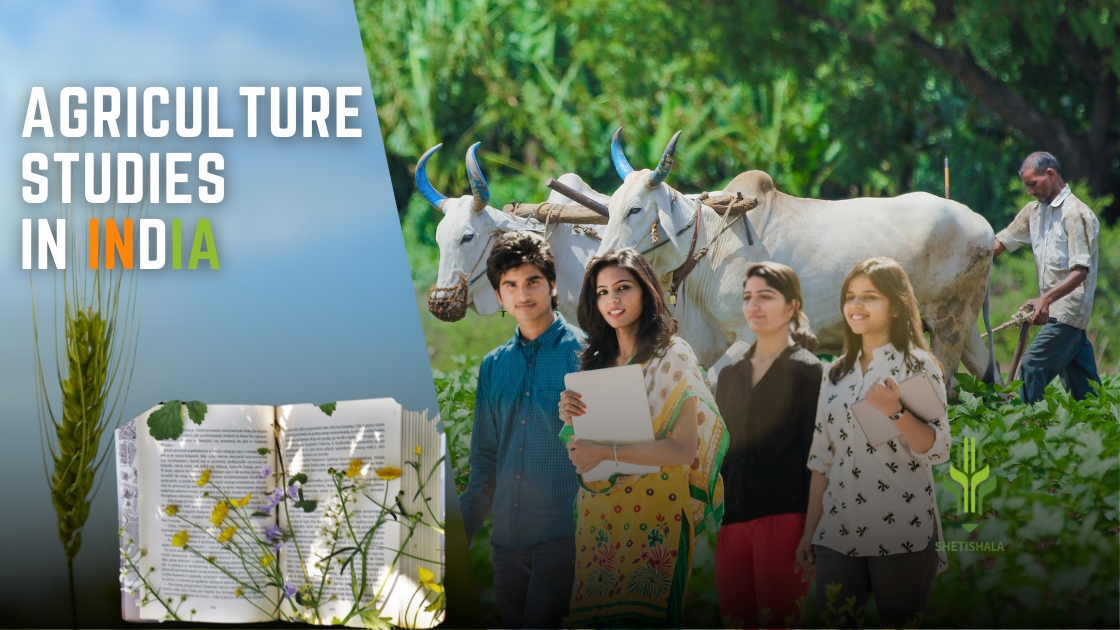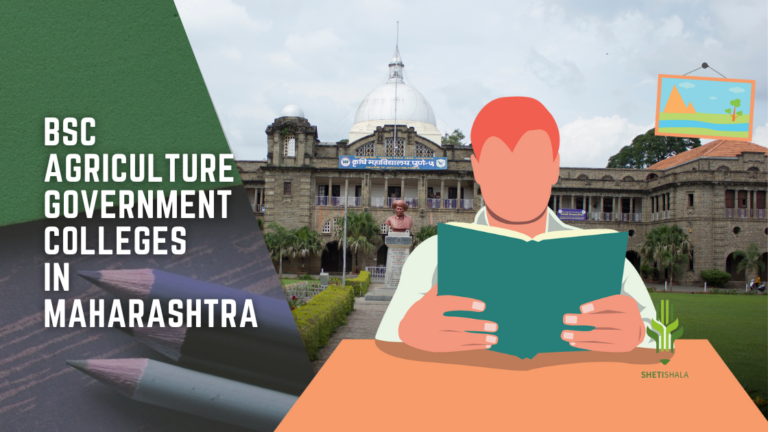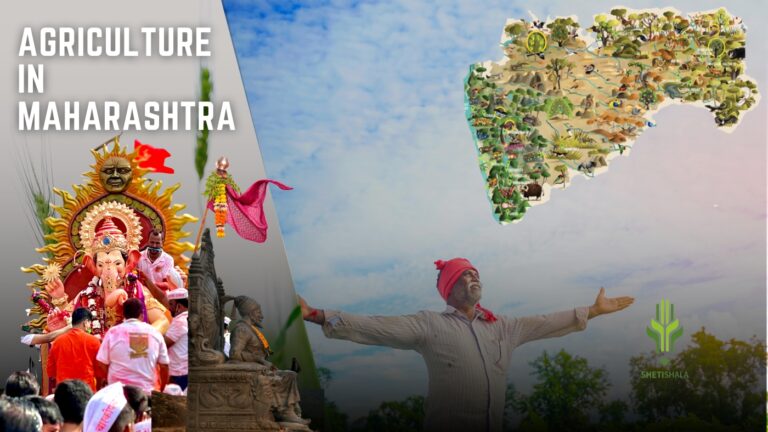• Introduction
Agriculture studies in India in important because agriculture has been the cornerstone of India’s economy and culture for millennia. As one
of the world’s leading producers of various agricultural products, India relies heavily on its
agricultural sector for food security, employment, and economic stability. Understanding
and advancing agricultural studies is crucial for sustaining and enhancing this vital sector.
This comprehensive blog explores the landscape of agricultural studies in India, covering
the premier institutes, modern technologies, research advancements, and the challenges
and opportunities facing the sector.

• Historical Context
India’s agricultural education system has evolved significantly since the establishment of
the first agricultural colleges in the early 20th century. These institutions were primarily
aimed at improving agricultural practices and boosting productivity. Post-independence,
the Green Revolution of the 1960s marked a significant turning point, emphasizing the
need for advanced agricultural research and education to ensure food security.
❖Leading Agricultural Institutes in India
India is home to several prestigious institutions dedicated to agricultural education and
research. These institutes play a crucial role in shaping the future of agriculture by
providing cutting-edge knowledge, innovative technologies, and skilled professionals.

**1. Indian Agricultural Research Institute (IARI), New Delhi:**
IARI, popularly known as the Pusa Institute, is a premier institution for agricultural
research and education in India. Established in 1905, it has made significant contributions
to the development of high-yielding crop varieties, improved farming techniques, and
sustainable agricultural practices.
**2. National Dairy Research Institute (NDRI), Karnal:**
NDRI is a leading institution in dairy research and education. It focuses on improving dairy
production, processing, and management through innovative research and training
programs.
**3. Tamil Nadu Agricultural University (TNAU), Coimbatore:**
TNAU is a renowned agricultural university that offers a wide range of undergraduate and
postgraduate programs in agriculture and allied sciences. The university is known for its
research in crop improvement, biotechnology, and sustainable farming practices.
**4. Punjab Agricultural University (PAU), Ludhiana:**
PAU played a pivotal role in the Green Revolution and continues to be a leader in
agricultural research and education. The university focuses on developing high-yielding
crop varieties, efficient water management practices, and integrated pest management
strategies.
**5. Indian Veterinary Research Institute (IVRI), Bareilly:**
IVRI is a premier institute for veterinary education and research in India. It focuses on
animal health, production, and disease management, contributing to the overall
development of the livestock sector.
**6. University of Agricultural Sciences (UAS), Bangalore:**
UAS Bangalore is known for its research in crop science, soil science, and agricultural
engineering. The university offers comprehensive programs that cover various aspects of
agricultural education and research.
❖ Modern Technologies in Agricultural Studies
The integration of modern technologies in agricultural studies has revolutionized the way
we approach farming, research, and education. These technologies enhance productivity,
sustainability, and resilience in the agricultural sector.

**1. Precision Agriculture:**
Precision agriculture involves using advanced technologies such as GPS, remote sensing,
and IoT devices to monitor and manage agricultural practices with high accuracy. It enables
farmers to optimize inputs, reduce waste, and increase yields.
**2. Biotechnology:**
Biotechnology plays a vital role in developing genetically modified crops that are resistant
to pests, diseases, and environmental stresses. It also includes advancements in tissue
culture, marker-assisted selection, and molecular breeding.
**3. Drones and UAVs:**
Drones and Unmanned Aerial Vehicles (UAVs) are used for crop monitoring, soil analysis,
and precision spraying. They provide real-time data on crop health, enabling farmers to
make informed decisions.
**4. Artificial Intelligence and Machine Learning:**
AI and machine learning algorithms are used to analyze vast amounts of agricultural data
to predict weather patterns, optimize irrigation schedules, and identify pest and disease
outbreaks. These technologies improve decision-making and resource management.
**5. Blockchain Technology:**
Blockchain technology ensures transparency and traceability in the agricultural supply
chain. It helps in verifying the authenticity of products, reducing fraud, and ensuring fair
pricing for farmers.
**6. Hydroponics and Aeroponics:**
These soilless farming techniques allow for the cultivation of crops in controlled
environments. They require less water, reduce the need for pesticides, and enable year round production of high-value crops.
❖ Research and Innovation in Agriculture
Research and innovation are the backbones of agricultural advancement. Indian
agricultural research institutes and universities are at the forefront of developing new
technologies, crop varieties, and sustainable farming practices.

**1. Crop Improvement:**
Research in crop improvement focuses on developing high-yielding, disease-resistant, and climate-resilient crop varieties. Techniques such as genetic engineering, marker assisted selection, and CRISPR-Cas9 are used to enhance crop traits.
**2. Sustainable Farming Practices:**
Sustainable farming practices aim to reduce the environmental impact of agriculture
while maintaining productivity. Research in this area includes organic farming, integrated
pest management, agroforestry, and conservation agriculture.
**3. Soil Health and Nutrient Management:**
Understanding soil health and nutrient management is crucial for sustainable agriculture.
Research focuses on soil fertility, micronutrient management, and the use of bio-fertilizers
to improve soil health.
**4. Water Management:**
Efficient water management practices are essential for agriculture, especially in waterscarce regions. Research includes the development of efficient irrigation systems,
rainwater harvesting techniques, and water-use efficiency in crops.
**5. Climate Change Adaptation:**
Climate change poses significant challenges to agriculture. Research in this area focuses
on developing climate-resilient crops, understanding the impact of climate change on
agriculture, and developing adaptive strategies for farmers.
❖ Challenges in Agricultural Studies
Despite significant advancements, agricultural studies in India face several challenges that
need to be addressed to ensure the continued growth and sustainability of the sector.

**1. Funding Constraints:**
Limited funding for agricultural research and education hampers the development of new
technologies and practices. Increased investment from both public and private sectors is
essential.
**2. Knowledge Dissemination:**
Bridging the gap between research and practice is crucial. Effective extension services
and farmer education programs are needed to ensure that innovative practices reach the
grassroots level.
**3. Infrastructure Development:**
Developing modern infrastructure for research, education, and extension services is
essential. This includes state-of-the-art laboratories, research farms, and digital platforms
for knowledge sharing.
**4. Policy Support:**
Supportive policies are necessary to promote agricultural research and education. This
includes policies for funding, intellectual property rights, and incentives for private sector
participation.
**5. Climate Change and Sustainability:**
Addressing the impact of climate change on agriculture requires a multidisciplinary
approach. Research, education, and policy must work together to develop sustainable
farming practices and climate-resilient crops.
❖ Opportunities and Future Directions
The future of agricultural studies in India is promising, with several opportunities for growth and development.

**1. Digital Agriculture:**
The integration of digital technologies in agriculture, such as big data analytics, IoT, and
AI, offers immense potential for improving productivity, efficiency, and sustainability.
**2. Public-Private Partnerships:**
Collaborations between public research institutes, private companies, and international
organizations can drive innovation and provide the necessary resources for agricultural
development.
**3. Youth Engagement:**
Encouraging youth to pursue careers in agriculture through scholarships, internships, and
entrepreneurship programs can bring fresh perspectives and innovative solutions to the
sector.
**4. Global Collaborations:**
International collaborations in research and education can provide access to advanced
technologies, funding, and knowledge exchange, benefiting the Indian agricultural sector.
**5. Sustainable Development Goals (SDGs):**
Aligning agricultural research and education with the United Nations Sustainable
Development Goals can ensure a holistic approach to development, addressing food
security, poverty alleviation, and environmental sustainability.
❖ Conclusion
Agricultural studies in India are at a critical juncture, with the potential to drive significant
advancements in productivity, sustainability, and resilience. By leveraging modern
technologies, fostering innovation, and addressing key challenges, India can ensure a
robust and sustainable agricultural sector. The collective efforts of research institutes,
universities, policymakers, and farmers are essential in shaping the future of agriculture in
India. As we move forward, a strong commitment to agricultural education and research
will be the key to unlocking the full potential of India’s agricultural sector.
for more such detailed educational blogs visit –
Career Opportunities after Agriculture Diploma, Degree and Post Graduation




